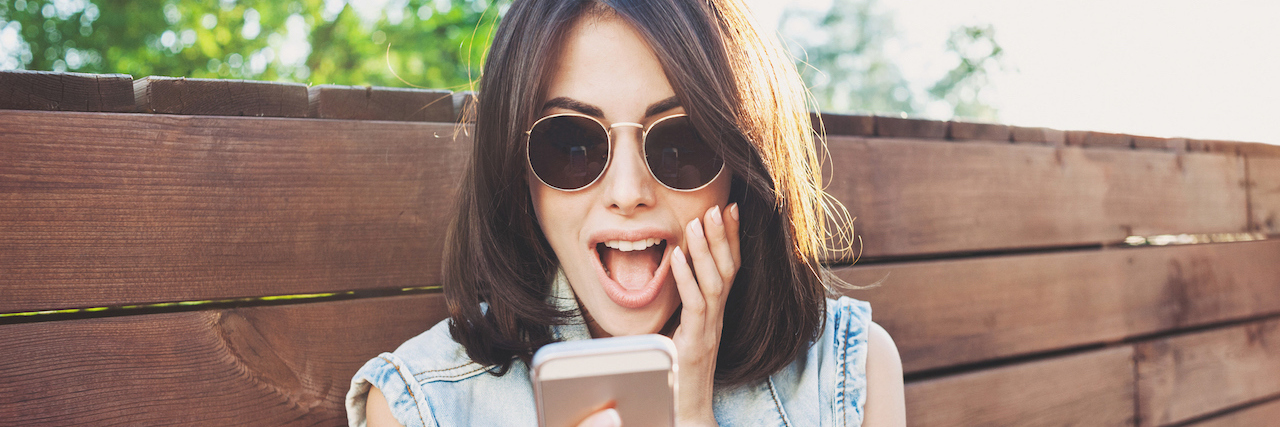Researchers Say Instagram Is the 'Worst App' for Your Mental Health
According to new research, Instagram is the worst social media platform for your mental health. A survey conducted by the U.K.’s Royal Society for Public Health found that Instagram has the highest negative affect on well-being — increasing anxiety, depression and self-identity and body image issues for young people ages 14 to 24.
But for better or worse, the picture-sharing app has more than 700 million users, and like any tool, it can be used with both good and bad intentions. Instead of advocating for people to stop using Instagram (we have one too!), we wanted to start a discussion about how to make your Instagram habit better for your mental health.
Here are some strategies we thought of. Feel free to share your tips and suggestions in the comments below.
1. Consider your motivation when following “aspirational accounts.”
If Instagram’s good at one thing, it’s making “pretty things” looks even prettier. Some people have built entire careers around putting filters on their already glamorous-looking lives.
Whether it’s a fitness inspiration account or a travel blogger, check your intentions when following these popular accounts. Do these pictures inspire you, or do they make you feel like your life is lacking? If you’re already dealing with feelings of negative self-worth, or are currently stuck in a dark place, these accounts — that only show the “good” parts of someone’s life — might do more harm than good. Because that’s what they are — a window into manufactured perfection, not a realistic view of how life really is. Real life is messy and unfiltered, and you shouldn’t compare your situation to the accounts you follow online. Consider unfollowing accounts that produce more jealously than happiness when you’re having a hard time.
2. Learn how to report triggering images to keep Instagram safe.
If you follow a lot of mental health-related accounts, you might run into triggering images related to self-harm, suicide or even eating disorders. If that’s triggering for you, it might be triggering for other people, too. Now when you report a post for self-injury, not only are you making Instagram safer for other people, but Instagram will send the person who posted the concerning photo resources.
If you think someone needs help, here’s how to report concerning content on Instagram.
3. Follow accounts that make you feel good.
Instead of following accounts that post pictures of who you want to be, follow accounts that post pictures of stuff which makes you happy. Puppies, silly videos, funny memes… whatever you know makes you smile. Sure, having a happy Instagram feed won’t cure any mental health issues you’re currently going through, but it might provide some much-needed relief when you’re having an off day and need a healthy distraction.
4. Make it part of your recovery.
Fortunately, there are so many amazing people and organizations making content tailed for people living with a mental illness, or for anyone who’s mindful of their mental health. Whether it’s a reminder that taking medication is OK, or an honest anecdote you can relate to, the mental health community has embraced Instagram as a place to spread love and comradery.
Here’s a list of some of our favorite mental health Instagram accounts.
5. Fill your feed with diversity.
Fill your media diet different body sizes, skin colors and backgrounds. Seeing diversity, and exposing yourself to different perspectives, is an amazing way to embrace your own. The beautiful thing about social media is that it gives you control over what you see. You don’t have to passively consume images that make you feel inadequate. Find people who look like you. Find people who don’t like you. Follow people who are confident in who they are, and remind yourself that you’re OK too.
6. Don’t let it consume you.
If you notice you’re getting consumed by your Instagram feed, it may be time to put your phone down and restrategize. For example, I know when I’m tired and getting ready to go to sleep, it’s easier for me to get stuck in social media, scrolling for way longer than I have to, even when it’s making me anxious. Be mindful of how you’re using social media, and don’t use to avoid doing things that are good for your mental health (for me, that’s getting to bed on time).
If you’re in a situation when you’re on your phone because of your anxiety, check out this list of relaxing things you can do on your phone that don’t involve being on social media.
What would you add? Tell us in the comments below.

